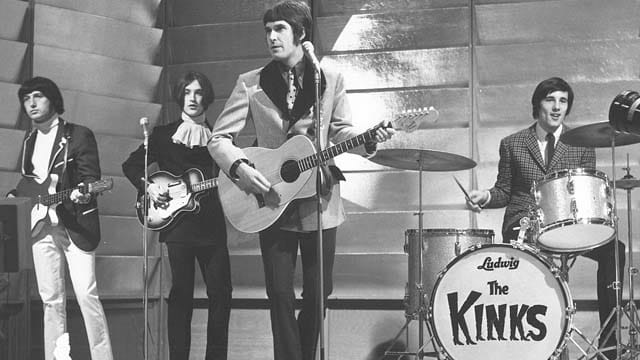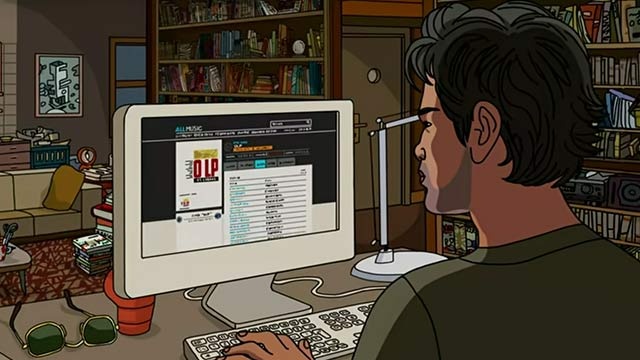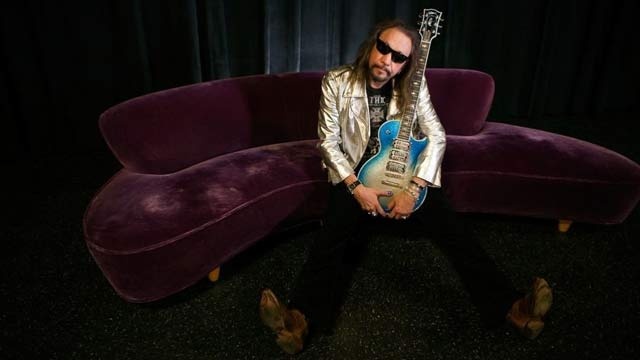Available in several different configurations (2CD, 2LP, Digital, and HD Digital), the just-released The Journey: Part 1 includes tracks selected by the Kinks’ three surviving original members (Ray Davies, Dave Davies, and Mick Avory) – which span 1964-1975 and are split into four different categories:
1. Songs about becoming a man, the search for adventure, finding an identity and a girl
2. Songs of ambition achieved, bitter taste of success, loss of friends, the past comes back and bites you in the backside
3. Days and nights of a lost soul, songs of regret and reflection of happier times
4. A new start, a new love, but have you really changed? Still haunted by the quest and the girl
Just a few days before the set’s arrival on March 24, 2023 (there will be a Part 2 issued later this year), Avory spoke to AllMusic from England, and discussed the set, his favorite Kinks tracks, and his relationship with the Davies brothers.
AllMusic: Let’s discuss the new box set, The Journey. I understand you, Ray, and Dave chose the songs.
Avory: “They said, ‘You can put some songs in between the ’60s and the ’80s. And it can be anything off any album – anything of your choice.’ I liked picking the more obscure ones – because they get overlooked very often. But obviously, we have to put the ones that were most known in, as well. On an album like this you’ve got plenty of room for different stuff. So, for instance the Schoolboys in Disgrace album – there’s loads of tracks, like ‘I’m in Disgrace,’ ‘Schooldays.’ It’s got a good range of choices. Some of those tracks are probably not used very much. ‘No More Looking Back’ was one of my favorites – I’d never seen it on a compilation. That was one of my choices.”
AllMusic: What is the most underrated or overlooked Kinks song?
Avory: “It’s difficult, really. ‘She’s Got Everything’ was a good track.”
AllMusic: At what point did you realize Ray was a truly gifted songwriter?
Avory: “Quite early on. But as you got along, you realize how more and more how prolific he was. And looking back, you think, ‘God. I just joined the group randomly.’ Because I come from the other side of London. I didn’t have anyone to play with in my district, so I used to go to work, and I thought, ‘I really want to try and get in a band’ – that was in the vogue of rhythm and blues at the time. That’s what they were playing when I got the job. But it all changed pretty quickly when they had a hit and had made a couple of records. I thought, ‘This is great,’ but I was sort of thrown in the deep end a bit – going from an ordinary job in Hyde Street, and then three days on, I was in the studio in Kingsway on Ready Steady Go!. It was more than a dream come true – because I’d never envisioned anything like that.”
“We all said, ‘We’ll give it two or three years…maybe five years. It might do well in the meantime, and we’ll enjoy ourselves.’ That was as far forward as we thought. But as time went on…Ray didn’t write them all – particularly the first album [1964’s Kinks] and on the second [1965’s Kinda Kinks]. But by the time we did the more conceptual stuff like Village Green, it was quite obvious he could write about nostalgia and all his observations of life – the way things are, the way things have gone wrong. You didn’t realize he had that sort of knowledge and vision at first. But in those songs, we began to realize the lyrics were so poignant – it told a story or described a feeling or described what was going on in the world with the government. I thought, ‘This is great’.”
“It was a different angle. There were protest songs [by other artists], but not of observation and describing what was going on. But it didn’t happen all at once. 1966 was a good year, because our football team [England] won the World Cup, and we had a #1 hit with ‘Sunny Afternoon.’ So, that was a good memory. And Ray then decided to write those types of songs – experiences of life. ‘Dead End Street’ is another one like that. I always thought of them as ‘modern blues songs’ – instead of moaning about having to pick cotton or writing about living conditions and taxmen and all that stuff.”
AllMusic: Was “You Really Got Me” the first-ever punk rock song?
Avory: “I never thought of it that way, but I suppose…it certainly started off that guitar sound. It was in your face and had impact. Whereas all the other bands at the time – the Searchers and all that – they were good musicians and played nice melodies on the guitar, and nice little solos. But this was in your face – the riff. There was nothing else like it. So, that set a patent for people to cling onto and it all develops and it became sort of ‘punk’.”
“And it went over the top – you didn’t even have to play the instruments in the end. I think the drummers were the best musicians in the bands. But it was an exciting time for the youngsters – spitting at each other, misbehaving, and being as horrible as possible. But Dave, it was probably just an accident – an accident that worked. And he had somewhere to put it because Ray wrote that song – it married the two things together. I couldn’t believe it when they first introduced it to me. We played it on stage and I thought it was a departure from what we were doing. But as we played it more and we recorded it, it made more sense then. So yeah, it definitely started off a trend.”
AllMusic: What did you think of Van Halen’s cover?
Avory: “It was just an exaggeration of what the Kinks did, really. Because he [Eddie Van Halen] never played a real melodic solo – it was just a lot of notes, and very good technically. And the sound and everything was really good. It was just an exaggeration – ‘I’ll play more notes than Dave did and go over the top with it.’ That’s how things move on though, don’t they? But I think it stopped there – at least they didn’t just copy it, and did their own thing to it. I listened to ‘Jump’ the other day and I liked that song. But that’s all synthesizer then – but it was interesting. He does do a short guitar solo, but the main theme is all synthesizer. Just a good song.”
AllMusic: Several names have been linked to the Kinks early on, including Shel Talmy and Jimmy Page. How important of a role did they play in the studio?
Avory: “Well obviously Shel Talmy was taken on by Pye Records, so he had to try and make a name for himself – and ‘earn his crust,’ as it were. Make an impression. So, he had a style. I think it fit more when he produced the Who. The harder songs he was better at – he seemed to over-record things as they were then, because of feedback and all those things that were ‘unwanted’ in the early days. Everything had to be clean. But he seemed to be able to cope with the dirtiness and the production – so it’s not all delicate guitar playing. But he missed out I think on some of the more quiet songs, that were a bit more subtle. But on the other hand, he was there with ‘Sunny Afternoon’ – I suppose he could cross-over.”
“But Ray was always with him, so we didn’t just give him the tapes and say, ‘Get on with it.’ Ray was over his shoulder. So, it was a joint effort in a way, really. The band recorded ‘You Really Got Me’ twice, and Ray wasn’t pleased with it because there was too much echo on the original. That wouldn’t have been done if Ray hadn’t of been there. It just didn’t sound right. But if you’ve written a song and you live with the damn thing day and night, you’ve got more idea what you want than someone coming in. Which is probably why Ray never had a producer, really.”
“But it gets a bit tiresome when you have to do everything. That was Ray’s nature, anyway – he knew that at the end of it, if he got someone else that ignored it until they finished it and then listened to it, that he’d go, ‘On no. That’s not how I envisioned it.’ So, he’d have to do it again anyway. It was a difficult band because of that – it was difficult to work with him.”
AllMusic: And what about Jimmy Page’s contribution?
Avory: “He did very little as far as I remember. He came into the studio – I think he came in during ‘You Really Got Me.’ He sort of apparently snickered at what Dave had done, because he was a more ‘polished player.’ And then he spent the rest of his years saying, ‘I played the solo on it.’ He must have said it, because everyone else was asking the question. But that was definitely Dave Davies, because even without knowing, you know it’s Dave rather than Jimmy Page. It just wasn’t in him to play like that. It was just completely off the top of his head – that solo. It fit – the attitude off it. And I never heard that from session men. They just come in and play something they feel – not what is necessarily the right thing. So, not much.”
AllMusic: How is your relationship currently with Ray and Dave, and would you ever consider playing together again?
Avory: “After I left in 1984, we owned a studio, so I used to work there. And I used to go out and do gigs with other bands. It was just working with Dave in the end – it was quite obvious that we weren’t getting on well, and it was effecting what we were doing. I said to Ray, ‘I can’t carry on with Dave with his attitude towards me. I’m not happy, so I’m going to go. So, good luck.’ He didn’t really want me to leave, because instead of being in between them and helping them work together, I’d say I was in the way in the end. That’s how it felt – I was in the way, rather than being a mediator. Because Dave had become more and more ‘remote’ on tour, and you’d hardly see him at all. You’d only see him on stage, and he was acting strangely. He wasn’t really good to me. I could get on with Ray – it wasn’t so personal. So, that was it. I felt I’d done everything – they were the best years when I was with them.”
“But you asked if we’d ever go on tour together now, we’d been through all that the last 20 or so years. I don’t think it’s possible now – one thing, health-wise. And I don’t think we could ever work it out because Dave wanted to do it one way, and Ray wanted to do it the other – which was quite normal thinking for them. But I always turn to Ray because he did consider the whole thing – he didn’t just consider, ‘This is what I want to do.’ He used to consider, ‘What’s the best thing to do?’ That’s why I always listened to Ray. Ray thought it as doing as an ‘evolution tour’ – you have different people who came into the band and what songs they recorded on and what songs effected them. I thought that would be more interesting. But I think Dave just wanted ‘a band’ – not particularly with me in it. Just reform something like they had when I left – just a band with him and Ray in it, really. It’s a team thing, and if you’re not a ‘team man,’ you don’t think like that.”
For more Kinks info, visit the official Kinks site.



